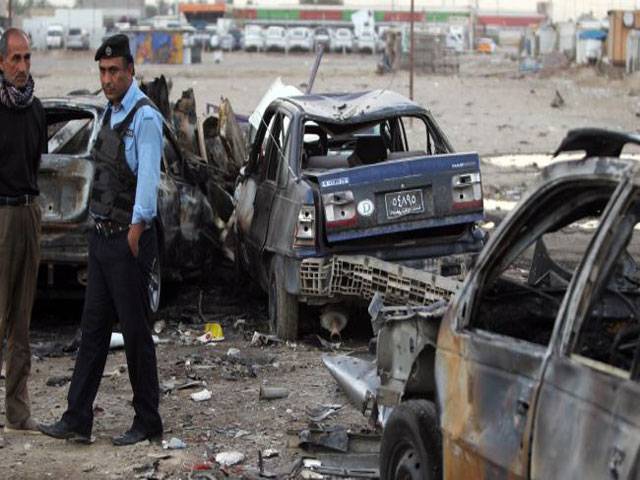BAGHDAD : Attacks in Baghdad and north of the capital killed nine people on Friday, including a supporter of powerful cleric Moqtada al-Sadr who was standing in April’s parliamentary election. The murder of Hamza al-Shammari, the first of an election candidate, comes amid a protracted surge in bloodshed with near-daily attacks nationwide and security forces battling anti-government fighters in Anbar province.
Election candidates have been targeted in the past, with nearly 20 hopefuls killed ahead of April 2013 provincial council elections. Shammari, a senior leader of the Shammar tribe in Baghdad, was killed by gunmen using silenced pistols in the west Baghdad neighbourhood of Ghazaliyah, two security officials said.
He had been due to stand in the April 30 election as part of the Ahrar list, which is loyal to the Sadrists.
North of Baghdad, separate bombings killed eight people, security and medical officials said.
In Tuz Khurmatu, a car bomb set off by a suicide attacker at a main intersection in the centre of the ethnically mixed town killed five people and wounded 27 others.
Another vehicle rigged with explosives was detonated near a passing army patrol in Baiji, killing three soldiers.
Violence in Iraq is at its highest level since 2008, with government data showing more than 1,000 people killed last month.
Diplomats have called for the government to do more to reach out to the disaffected Arab minority, but Prime Minister Nuri al-Maliki has taken a hard line ahead of the election.
No one has admitted responsibility for the surge in attacks, but militant groups, including the Islamic State of Iraq and the Levant (ISIL), a powerful jihadist group, have been blamed.
ISIL has also been fighting security forces in Anbar, a mostly desert region bordering Syria where militants have held parts of Ramadi and all of Fallujah for weeks.
Security forces and tribal auxiliaries have made slow progress in reclaiming neighbourhoods of Ramadi, but have largely stayed out of Fallujah for fear that major incursions could spark high civilian casualties and heavy damage to property.
The city was a bastion of the insurgency following the 2003 US-led invasion, and American troops there fought some of their costliest battles since the Vietnam War.
The Anbar stand-off has prompted more than 140,000 people to flee their homes, the UN refugee agency said, calling it the worst displacement in Iraq since the peak of sectarian fighting between 2006 and 2008.
Friday, April 19, 2024
Iraq attacks kill nine including poll candidate

Caption: Iraq attacks kill nine including poll candidate
China's EV tech offers opportunity for Pakistani auto industry
9:27 AM | April 19, 2024
PM calls for reforms to reduce circular debt
April 19, 2024
Pakistan, Turkiye to expand defence ties
April 19, 2024
20pc Discos employees involved in power theft: Minister
April 19, 2024
Five govt officials shot dead in D I Khan
April 19, 2024
Hepatitis Challenge
April 18, 2024
IMF Predictions
April 18, 2024
Wheat War
April 18, 2024
Rail Revival
April 17, 2024
Addressing Climate Change
April 17, 2024
Justice denied
April 18, 2024
AI dilemmas unveiled
April 18, 2024
Tax tangle
April 18, 2024
Workforce inequality
April 17, 2024
New partnerships
April 17, 2024
ePaper - Nawaiwaqt
Advertisement
Nawaiwaqt Group | Copyright © 2024





